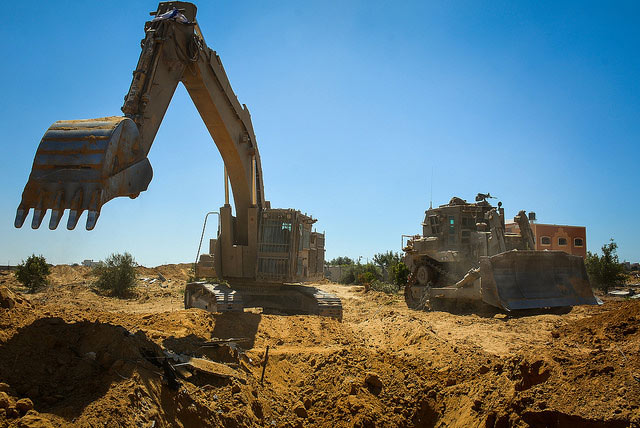
On Tuesday morning, the Israeli army demolished 23 Palestinian homes in two villages in the South Hebron Hills, leaving 100 people homeless.
Breaking the Silence, the Israeli group of former soldiers, called the actions the largest demolition to take place in over a decade in the occupied West Bank.
The demolitions were carried out in an area Israel declared a closed military zone as far back as the 1970s.
Thirty square miles in size, it includes a dozen villages where Palestinians have lived for generations.
Residents of the area have resisted Israeli efforts to expel them for years. In the meantime, Israel has allowed Jewish settlements in the area to flourish.
Called Firing Zone 918 by Israel, the cluster of villages is known by Palestinians as Masafer Yatta.
Another twenty homes and buildings in the area are also imminently slated to be razed, but lawyers for the villages obtained a court injunction preventing further demolitions until next week.
Residents have been living with the threat of forcible expulsion for the last 17 years.
In 1999, the Israeli army issued its first evacuation orders to the villagers. After the Association for Civil Rights in Israel and attorney Shlomo Lecker petitioned Israel’s high court, the residents were permitted to temporarily return on condition they entered an arbitration process with Israeli occupation authorities.
Unilateral Termination
After negotiations began, Israel offered to transfer the villagers to another area. The villagers refused.
The Association for Civil Rights in Israel and attorney Shlomo Lecker again petitioned against any forcible transfer. On Monday, Israel unilaterally terminated the ongoing mediation.
COGAT, the army’s unit that rules the Palestinian population in Area C, stated that “enforcement measures were taken against illegal structures and solar panels built within a military zone.”
In 2012, Israel announced it had reduced the scale of its firing zone, allowing four of the Masafer Yatta villages to remain.
But if completed, the demolitions would leave a total of 1,000 people homeless across eight other villages, according to Israeli human rights group B’Tselem.
Israel has prohibited the construction of any permanent structures in its self-declared firing zone.
Israel claims that the area is essential to train Israeli military forces.
Masafer Yatta lies in Area C, the approximately 60 percent of the West Bank that is under complete Israeli military and civilian control under the terms of the 1993 Oslo accords.
International law prohibits the forcible transfer or displacement of an indigenous population by an occupying power.
Over the course of 2015, Israel demolished 521 structures in Area C as well as in East Jerusalem, displacing 636 people, according to the UN monitoring group OCHA.
The vast majority of these demolitions were carried out on the grounds that Palestinians did not have permission to build. Between 2010 and 2014, only 1.5 percent of applications for building permits in Area C were approved by Israeli occupation authorities.
No Warning
The villages that lie in Masafer Yatta are impoverished and Israel has refused to allow them to connect to water and electricity services.
They depend entirely on solar panels or communal generators for electricity and the children must travel up to six miles over a rocky terrain to reach the nearest school.
Israel has issued demolition orders for 15 cisterns, 19 toilets and cesspools that were built with the assistance of the UK government.
Tuesday’s demolitions came with little warning.
According to The Guardian, the military marked villagers’ homes the night before. Residents were left to guess what lay ahead by overhearing soldiers speaking in Hebrew.
Following the demolitions on Tuesday, villagers retrieved furniture from the ruins of their homes and set up tents, The Guardian reported.
Other families moved their belongings into caves, which will provide shelter.
Khalil Musa, was born in 1942 in Khirbet al-Markaz, one of the villages the Israeli army wants to remove.
He told B’Tselem that despite the hardships of living in the poor and isolated community, “The families work the land and raise sheep and we have a small, perfect community here.”
“Our way of life is primitive and difficult, but we have strong ties to this place and have no other alternative,” Musa added. “We are connected to the land and the livestock, which are our livelihood.”
Join us in defending the truth before it’s too late
The future of independent journalism is uncertain, and the consequences of losing it are too grave to ignore. To ensure Truthout remains safe, strong, and free, we need to raise $27,000 in the next 24 hours. Every dollar raised goes directly toward the costs of producing news you can trust.
Please give what you can — because by supporting us with a tax-deductible donation, you’re not just preserving a source of news, you’re helping to safeguard what’s left of our democracy.